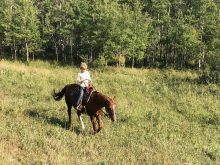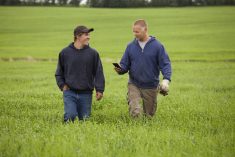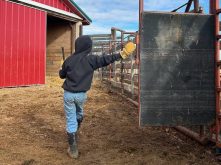Twenty years ago, at coaching school, I embraced a Beanie Baby bull as the metaphor for the “bull in the middle of the farm kitchen” which no one wants to talk about. My “tools for talking about tough issues” can help you navigate the hot days of August on the combine, grain cart, pasture or off-farm job.
Take charge
You get the behaviour you accept. My combine-driving days are past, but I recall our employee Ray explaining to me why it was important to cut the grain lower and not too high. This was unusual behaviour for him as he wasn’t often very vocal about what would make his fieldwork jobs easier for a better outcome. What are you not taking charge of that you know you should be acting on? I hereby give you permission to ask for what you need. Do it with a kind tone of voice and with respect for the other person.
Read Also

Is the technology in our vehicles a help or a hindrance?
Not only does new tech allow people to operate vehicles and farm machinery with fewer skills, it also creates more problems for vehicle users when those systems fail, Scott Garvey writes.
Come from curiosity
My daughter-in-law has mastered this one when she asks for support with childcare. I appreciate her approach: “I’m just curious if you have time in your day to…” Curiosity comes across without a sense of making a demand or having judgment.
Also helpful: “Would you be able and willing to…?” It gives the listener a sense that you truly care to allow them to have a choice in their response for action. Marilee Adams calls this having a “learner mindset,” not being a judger.
Ask deeply
Use open-ended questions which don’t have a yes or no answer: “Tell me how you are feeling during this harvest. You seem to be very frustrated. Can you share what is really going on for you right now?” Express your desire to be supportive and not a cause of the frustration. Be open to feedback and give permission to the manager, family member or other workers to share, vulnerably, how things are going.
Dissect resistance
Rick Maurer wrote Why Don’t You Want What I Want? many years ago. He sees pushback in conflict coming from the head, heart and gut.
Folks may not be brave enough to admit to you that they don’t understand how to set the monitors…it’s a head issue. Others may be pushing back from requests because they have an emotional trigger which tells them “I don’t like how this feels!” Others may intuitively feel a lack of trust in their gut which tells them “I knew it was a bad idea not to check the fuel lid was tight on this combine!” Resistance to talking about tough issues can come from not understanding what is being discussed, not liking how it feels, and not trusting the request for action.
Really listen
Silence your cell phone, or better yet, put it away in another room. Be present to the conversation at hand. Many coaching families are surprised at the gift of feeling like they have been heard for the very first time. Are you able to seek out common interests by seeking what everyone wants for your farm — things like family harmony, collaborative decision-making, fair compensation? When people’s needs are not getting met, you get conflict. Where are the need disconnects happening?
Our five guys harvesting tell us what they like to eat and drink for meals in the field. We listen. And the next question is, have you listened to what your support team needs to make their jobs easier? (In this case it has something to do with not letting food containers go bad in the tractor.)
Take time to ponder
Plugging a combine is not fun, neither is shoving decision-making too quickly when folks need time to process a lot of new information. Ask the other person: “By when you will be able to give me a decision on this?” Parts people know the urgency of fulfilling orders in the chaos of harvest breakdowns. Remember, some folks need more time to make decisions — but be sure you agree on the time of execution of the decision. Share your intent about why the decision has a timeline and why it’s so important for you to have an answer.
Reflect on the other person’s comments and body language and let them know what effect their communication has on you. “It’s not my intent to push you away, Dad, but we need to figure out new roles for you on this farm as you step back without stepping away. It’s time for me to manage the harvest, and I am happy for your input and wisdom.”
Play with possibility
It was a happy day when our neighbour and his friends pulled into the field with more combines late in the season. He was finished and saw the need. We didn’t think to ask for help; he just showed up.
Sometimes we get tangled up when we pre-judge the outcomes for problem-solving. Dream big and explore options.
Besides, where is it written that it’s bad to ask for help? As I write this, I’ve already saved 18 hours by having a teenager cut our grass this summer, leaving me more time for pulling weeds or seeking out lower-maintenance yard work options (deep mulch). As you harvest this year, use your time to play with other options for business agreements — possibly a joint venture with a non-family member.
Take ownership
Cultivate trust by being reliable and accountable. Do what you say you are going to do. If you make a mistake, own it, be open about what happened, and ask what you can do to make things right.
This sounds like basic common sense, but as the Australians say, “Common sense is uncommon practice.” Procrastination and poor timing in harvest can cost thousands of dollars. What is the procrastination of avoiding hard conversations costing you, with the lack of effective decision-making for the future of your farm?
Strategic coach Dan Sullivan argues procrastination is a good thing while you are building your team of advisors or helpers to get the solutions you desire, if you don’t have the skills in place to do things yourself. Doing the harvest yourself is not going to work, and neither is doing the transition management plan by yourself. Grab the bull and get talking!
















